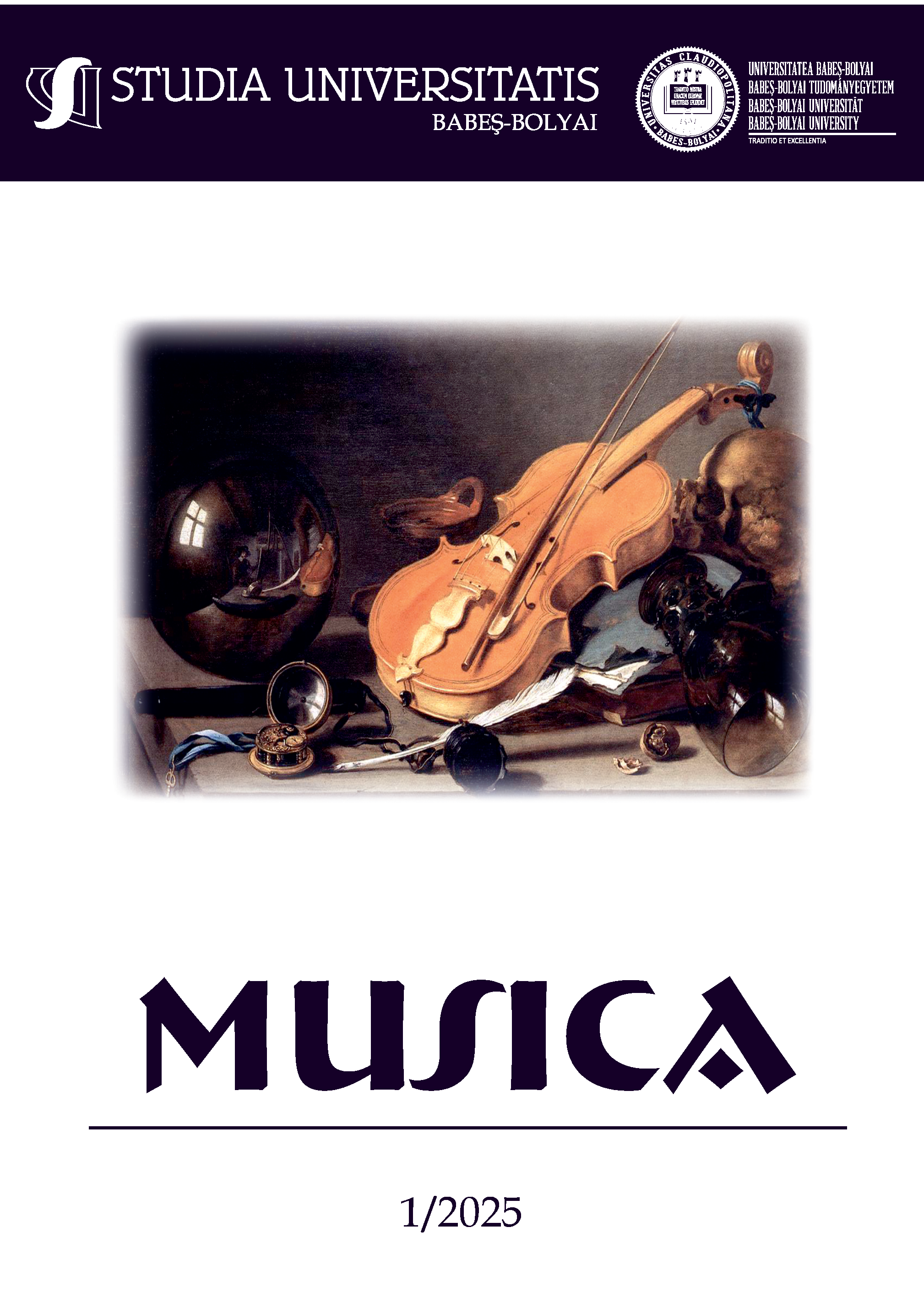Infancy: Primordial Trust Versus Primordial Mistrust – Recommending Personalized Music During the Prenatal and Infant Stages of Development
DOI:
https://doi.org/10.24193/subbmusica.2025.1.16Keywords:
infant development, primordial trust, attachment theory, music therapy, early childhood, maternal attachment, baptismal rites, emotional securityAbstract
This paper explores the underlying conflict between primordial trust and primordial mistrust, focusing on the role of early attachment in the development of mental health. It combines psychological, developmental and theological perspectives to show how the relationship between infant and caregiver influences later emotional and social functioning. Harlow’s monkey experiments and Bowlby’s attachment theory support the importance of secure attachment. The paper also discusses the role of music and religious rituals, especially baptism, in reinforcing emotional security. Analyzing the effects of prenatal and infant musical stimulation, it concludes that musical experiences and touch can jointly contribute to the development of primordial trust, which can form the basis of psychological resilience in later stages.
References
1. Andrek Andrea. A magzat üzenete - Kommunikáció és kapcsolat (The Message of the Fetus – Communication and Connection). (Online) Available at: https://mipszi.hu/cikk/a-magzat-uzenete-kommunikacio-es-kapcsolat (Accessed on February 17, 2025.)
2. Arp, Claudia and David. Answering the 8 Cries of the Spirited Child. Howard Publishing Co., Inc., Louisiana 2003, 1-12.
3. Atkinson, Tracy and Baran, Joan. Nazis: The Occult Conspiracy. Documentary film, USA, 1998.
4. Bálint Mihály. Az orvos, a betege és a betegség (The Doctor, His Patient, and the Illness). Animula Kiadó, Budapest, 1990.
5. Berkowitz, Ari. “Our gens, ourselves?” In BioScience, Vol. 46, No. 1, 1996, 42.
6. Benkő István. A gyermekkeresztség. Bibliai tanulmány (Infant Baptism. A Biblical Study). Tahitótfalu 1923, Sylveszter Könyvnyomda., Budapest, 1990.
7. Boorstein, Seymour. “Düh és halálfélelem” (Anger and Fear of Death). (Ford. Mirnics Zsuzsanna), In: Transperszonális pszichológia és pszichoterápia (Transpersonal Psychology and Psychotherapy). (szerk. Bagdy Emőke, Mirnics Zsuzsanna, Nyitrai Erika), Kulcslyuk Kiadó, Budapest 2011. 421-427.
8. Bowlby, John. Attachment and Loss: Separation, Anxiety and Anger. Vol. 2, Basic Books, London, 1973, 211-237.
9. Böjte Csaba. Út a végtelenbe (Path to Infinity). Csaba testvér gondolatai Isten ajándékairól (Brother Csaba’s Thoughts on the Gifts of God). Böjte Csaba válaszol Karikó Éva kérdéseire (Böjte Csaba in dialogue with Éva Karikó). Helikon Kiadó, Budapest, 2013.
10. Calvin, John. Institutio. (Trans. Viktor János), Kossuth Publishing, Budapest, 1995, 137-139.
11. Cochrane, Fiona. Music of the Brain. Documentary film, USA, 2009.
12. Cooper, Robin Panneton – Aslin, Richard N. “Preference for Infant-Directed Speech in the First Month after Birth”. In: Child Development, Vol. 61, No. 5, 1990, 1584-1595.
13. Ekman, Paul. “Strong evidence for universals in facial expressions: A reply to Russell’s mistaken critique”. In: Psychological Bulletin, vol. 115, 1994, no. 2, pp. 268-287.
14. Ekman, Paul - Wallace V. Friesen. “Constants across Cultures in the Face and Emotion”. In: Journal of Personality and Social Psychology, vol. 17, 1971, no. 2, pp. 124-129.
15. Fee, Christopher R. and Webb, Jeffrey B (Ed.). American Myths, Legends, and Tales. An Encyclopedia of American Folklor. Vol. I. A-F. ABC-CLIO, LLC, Santa Barbara, California 2016, 629.
16. Fernald, Anne – Kuhl, Patricia. “Acoustic determinants of infant preference for motherese speech”. In: Infant Behavior and Development, Vol. 10, 1987. no. 3, pp. 279-293.
17. Földvári Miklós István: “Az ókeresztyén liturgia – avagy hogyan ne írjunk liturgiatörténetet” (The liturgy of the early Christians - or how not to write a liturgical history?) In: Magyar Egyházzene, Vol. 20, 2012/2013, No. 4, p. 368.
18. Harlow, Harry F. – Harlow, Margaret K.: “Effects of various mother-infant relationships on rhesus monkey behaviors”. In: B. M. Foss (Ed.): Determinants of infant behavior IV, Methuen, London, 1969, 15-36.
19. Hámori József. “Az emberi agy és a zene” (The human brain and music). In András Falus (Ed.): Zene és egészség (Music and health). Kossuth Publishing House, Budapest, 2016. p. 23.
20. Hézser Gábor. Pasztorálpszichológiai szempontok az istentisztelet útkereséséhez (Pastoral psychological aspects of the search for the path to worship. Theoretical and practical perspectives). Kálvin János Publishers, Budapest, 2007, p. 67.
21. Ijzendoorn, Mariunus H. van. “Adult attachment representations, parental responsiveness, and infant attachment: A meta-analysis on the predictive validity of the Adult Attachment Interview”. In: Psychological Bulletin, vol. 117, 1995, no. 3, pp. 387-403.
22. Kozma Zsolt. Liturgika (Liturgy). Kis Miklós Reformed Press Centre of Misztótfalύ, Cluj-Napoca, 2000. 66.
23. Márai Sándor. Ég és föld (Heaven and Earth). Helikon Kiadó, Budapest, 2001.
24. Milavec, Aaron. The Didache. Text, Translation, Analysis, and Commentary. Liturgical Press, IX, Collegeville – Minnesota, 2003.
25. Molnár János: Zakariás próféta könyvének magyarázata (Commentary on the Book of Zechariah). The Transylvanian Reformed Church District Publication, p. 115.
26. Pál Ferenc. A magánytól az összetartozásig (From Loneliness to Belonging). Kulcslyuk Publishing, Budapest, 2014.
27. Piontelli, Alessandra. From Fetus to Child. Routledge, London and New York, 2002, 1-23.
28. Ravasz László. Kis dogmatika (A Little Dogmatics). Kálvin János Publishing, Budapest, 1996.
29. Tőkés István. “Szempontok a gyermek-keresztség kérdéséhez” (Perspectives on the Question of Infant Baptism) In Református Szemle, Vol. 47, 1954, No. 6, p. 162.
30. Varga Zsigmond J. (szerk.). Görög-magyar szótár az Újszövetség irataihoz (Greek-Hungarian Dictionary for the Writings of the New Testament). Kálvin János Publishing, Budapest, 1996.
Downloads
Published
How to Cite
Issue
Section
License
Copyright (c) 2025 Studia Universitatis Babeş-Bolyai Musica

This work is licensed under a Creative Commons Attribution-NonCommercial-NoDerivatives 4.0 International License.



